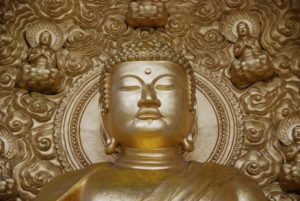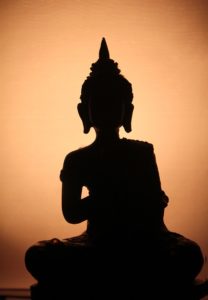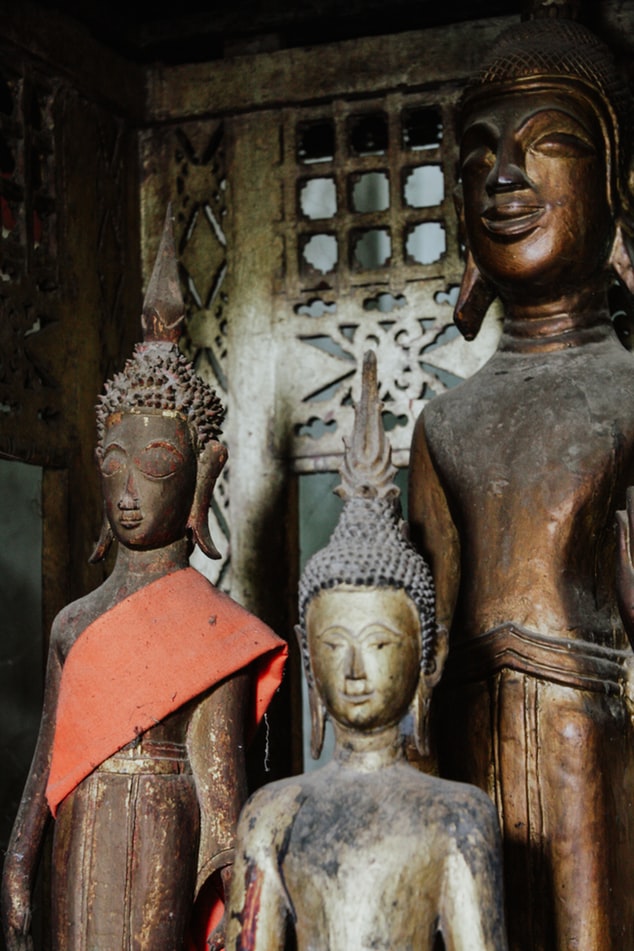For many, Buddhism borders on mysticism with some mythology thrown in. It’s hard for the Western mind to think of a religion that does not preach the existence of a god. Though Buddhism is not an atheistic religion, it does not directly deny nor accept the existence of God.
To many, Buddhists are looked upon as a melding of both philosophy and religion, a unique combination that doesn’t help to clarify what it is all about. However, when you look deep into the basic tenets, you find similarities to many of the laws propounded by Christianity, Islam, Hinduism and other faiths.
 For example, the Four Noble Truths expound that there is suffering in the world today, that there is a cause for that suffering and that the suffering can be alleviated by adhering to the Eightfold Path. In Buddhism, the cause of suffering is through “clinging” and “grasping” which can be translated as greed and coveting, both of which the Bible talks about. The Eightfold Path outlines the methods that can help end suffering through “Right Speech”, “Right action”, “Right livelihood” that can be translated as not lying or bearing false witness; honoring and loving others as you love yourself and living an exemplary lifestyle so others can be impressed with your Christian nature. The other five are geared to how you think but have similar correlations to Christian principles.
For example, the Four Noble Truths expound that there is suffering in the world today, that there is a cause for that suffering and that the suffering can be alleviated by adhering to the Eightfold Path. In Buddhism, the cause of suffering is through “clinging” and “grasping” which can be translated as greed and coveting, both of which the Bible talks about. The Eightfold Path outlines the methods that can help end suffering through “Right Speech”, “Right action”, “Right livelihood” that can be translated as not lying or bearing false witness; honoring and loving others as you love yourself and living an exemplary lifestyle so others can be impressed with your Christian nature. The other five are geared to how you think but have similar correlations to Christian principles.
In this light, Buddhism has much to say about the human condition and how life should be lived. It propounds the “Middle Path” as a method to reach enlightenment. As humans, we tend to swing from one extreme to another. Gautama, in his search for wisdom, found both asceticism and extreme wealth as unsatisfying. The Middle Way is the only way to promote peace and bring happiness. Moving to extremes brings unhappiness. It’s when you feel the most anger, resentment, and hatred toward others. You can never find mental peace and physical harmony when your mind is filled with vengeance.
Meditation is important in Buddhism
This is one of the principal reasons why Buddhism emphasizes the need for meditation. While we see no usefulness in sitting cross-legged for hours on a cushion while burning incense, meditation is useful in that it forces you to calm the usual turmoil in your mind. It brings a sense of peace and satisfaction by just sitting quietly without distractions.
 Our world today is filled with distractions. People are worried about the loss of their jobs and what the future may bring. Many people are on the run day and night and it shows in high blood pressure, heart disease and the many diseases that afflict so many. No one has time to relax, even on the Sabbath day as is commanded in the Bible.
Our world today is filled with distractions. People are worried about the loss of their jobs and what the future may bring. Many people are on the run day and night and it shows in high blood pressure, heart disease and the many diseases that afflict so many. No one has time to relax, even on the Sabbath day as is commanded in the Bible.
Ignorance with the way the body and mind works is what causes pain and suffering and prevents many from attaining “enlightenment” or Buddhahood. After spending a great deal of thought under the bodhi tree in India, Gautama was asked who he was and replied that he was “awake”. He found a source of peace and comfort in divesting himself of worldly ambition. This didn’t mean that he was going to stop making a living to spend the rest of his days meditating on a mountaintop. He taught the need for productive activity. He emphasized that it’s the selfishness that comes from grasping for material possessions and wealth at all costs that lower a man’s value to himself and society at large. The struggle for wealth and fame is illusory. It’s nothing more than a dream most of us engage in on a daily basis. Anything that can be touched or felt eventually deteriorates. No matter how large a bank account you have, your money will never be your permanent possession. That’s what makes anything material an illusion.
Focusing on spiritual matters
Gautama divested himself of his wealth and with his “disciples” went around preaching his principles of how to live. Christ did the same thing. Both emphasized the need to focus on spiritual matters, rather than the physical world. When Lazarus asked Christ how he could gain the kingdom of heaven, Christ answered that Lazarus should sell all he had and follow Him. Of course, this was hard for Lazarus to do as it would be so hard for any of us to do if we were asked to sell everything we own.
The middle way is the hardest path to walk since we are emotional creatures. It means moderation in all things and avoiding the extremes that we so easily fall into. Many of the masters have attained that state where they find peace, but they must continue to practice meditation in order to keep themselves from moving to extremes.
It would be so easy for the Dali Lama to develop hatred for the Chinese for the invasion of Tibet. He is concerned about the suffering of his people under Chines rule. Instead of hatred, he forgives them. Contrast this with the Taliban and the many terrorist organizations that seek revenge and resort to killing, even if it means that members of their own faith must die. They live unhappy lives, though they deceive themselves that they are doing God’s will.
Your behavior has consequences. Act in an evil nature and you will not be happy. So it is important for everyone to realize that nothing in this world can ever lead to happiness. But following the right Buddhist path or living by Christian principles is the only way you will ever achieve Nirvana.
https://www.youtube.com/watch?v=6FmDcR2hxgw





